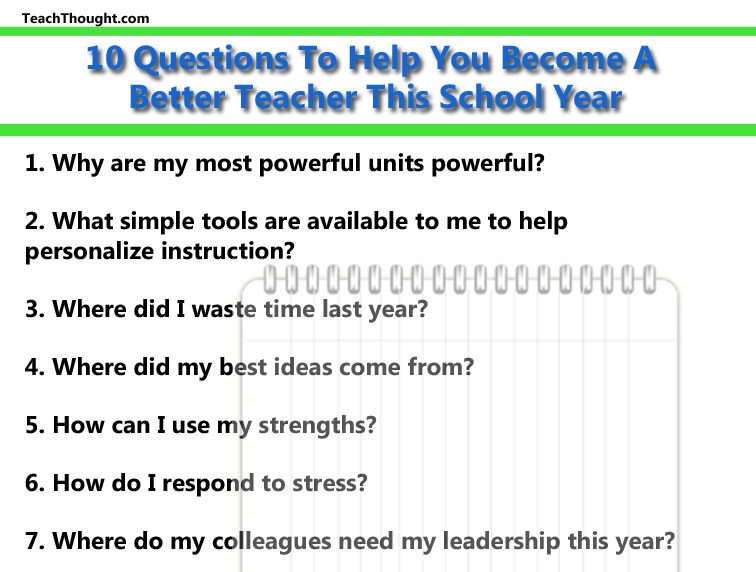What Questions Will Help You Become A Better Teacher This School Year?
by Terry Heick
1. Why are my ‘best’ lessons, assessments, and units ‘best’?
And how can I share those powerful characteristics across other units, because let’s be honest, not all of your units are created equal?
Your project-based learning unit that uses blogging and social media to allow students to reflect on global human rights issues went great last year, but your The Tone of Antebellum Southern Literature unit was less well-received–and a drag to teach. (And you were so excited when you wrote it!)
So this year, how can you take what works well from the Human Rights unit and extend it to other units?
2. What simple tools are available to me to help personalize instruction?
While many learning trends come and go, one that isn’t going anywhere is personalized learning.
Even if we end up calling it something else, providing students with the right resource, collaboration, question, or assessment at the right time is the can’t-miss learning trend of the millennium. So the first question then, besides “what is personalized learning,” is “What simple, easy to access and use tools do I have available to me to help personalize learning for students?
Choice boards? Exit slips? A flipped classroom? Project-Based Learning? Self-Directed Learning?
Notice how they got more complex fast? So narrow it down to perhaps 5, and start with the simple ones.
3. Where did I waste time last year?
There is something you do that wastes your time, and it may not be obvious.
Grading? Letting a 2-minute conversation turn into half your planning period? Looking for that magic bullet on the internet?
Try to pinpoint one or two time drains, and eliminate them.
4. Where did my best ideas come from?
Those great ideas–for unit themes, assessments, learning feedback, technology integration–where did they come from?
Your colleagues? Social media? PD? Books?
Pick what worked, and do more of that, and less of what didn’t.
5. How can I use my strengths?
You’re not organized, but you’re incredibly creative.
Your lessons don’t ‘curb appraise’ well on paper, but look great in action.
Your personality draws brilliant questioning out of students, but you do less well creating your own writing prompts.
So how can you use what you do naturally well to mitigate–and improve–your overall performance?
6. How can I take better care of myself? What does self-care mean to me? How do I respond to stress?
This one sounds out of place, but if you’ve ever taught, it makes sense. So, what has historically been your go-to strategy when deadlines—and the data—get tough? And more importantly, does that strategy serve you?
How do you respond when stress rises for you during the school year? Work harder? Smarter? Take work home and binge on diet Coke?
Lock yourself in your room and turn off the lights?
This year, there will be storms. Be aware of how you traditionally respond, and challenge yourself now, preemptively, to respond differently, in a way that supports your goals. Get closer to administrators you’re struggling to get along with. Take time to mentor the student that is challenging ‘that class.’
Make up your mind to improve your data sources if existing assessments contradict your gut instinct. And when those revised assessments say the same thing, well, it might be time to change the instructional design.
7. Where do my colleagues need my leadership this year?
You have your favorite councils, committees, and teams. But where do your colleagues need you?
8. What are the most important ideas in my academic standards?
Power standards are everything, but even more important are those content strands that can anchor everything for students. Take “theme,” for example in an English-Language Arts/Literature classroom. The author’s central message in a text or given media. Theme can teach thesis statements, tone, audience, diction, structure, idea organization, and even the writing process yourself.
That’s pretty important, and your curriculum maps and pacing guides should reflect that.
9. What has changed since last year?
What access to technology do I have? Computer labs? Mobile labs and laptop carts? Clickers? Maybe a grant no one knows about to get a set of Google Nexus tablets in your classroom?
Is there a new student information system? New academic standards? Some significant change in the student population?
Every year, things change. New hardware, new software, new policies, new rules. Get ahead of the game quickly, and adjust your units accordingly.
10. What’s my focus?
Of course, your focus is on your students. But what does that mean? In pursuit of that, you’ve got dozens of other minor goals–to give game-based learning a chance, to improve your use of student questioning, and to focus more on modeling expert use of the writing process for students.
You also want to form even better relationships with students, lead a committee or two, and, of course, lead students to master every single standard that exists.
Having a focus doesn’t mean you don’t make these sorts of commitments to yourself, but it can help you aggregate these sorts of minor objectives beneath a single umbrella.
Maybe it’s personalized learning. Or self-directed learning. Or more powerful use of Bloom’s taxonomy.
So pick something, and have it. Google it. Ask colleagues. Skim twitter. Read books. Find webinars. Tell us so we can help.
And be honest with yourself about how it all turns out.
10 Questions To Help You Become A Better Teacher This School Year

